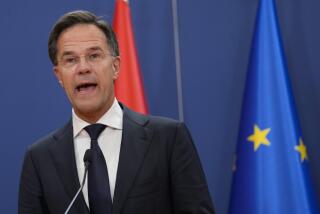ITALY: Spadolini, Party Quit Governing Coalition : Italy Defense Chief, Party Quit Coalition in PLO Rift
- Share via
ROME — Defense Minister Giovanni Spadolini and his Republican Party withdrew Wednesday from Italy’s governing coalition to protest the government’s release of a Palestinian leader the United States has accused of masterminding the hijacking of the Italian cruise liner Achille Lauro.
Spadolini’s withdrawal threatened the government of Prime Minister Bettino Craxi with imminent collapse.
The Republicans, the third-strongest element in the five-party Craxi coalition, pulled out after expressing outrage at Craxi’s failure to consult the coalition partners before releasing Abul Abbas, an official of the Palestine Liberation Organization wanted for questioning by the United States because of his alleged role in the Achille Lauro hijacking.
Spadolini, staunchly pro-American, pro-Israel and deeply suspicious of the PLO, said he expects his party’s defection to bring down the Craxi government.
A reliable source at Quirinale Palace, the office of Italy’s presidency, said Craxi plans to call on President Francesco Cossiga this morning, perhaps to submit his resignation.
But the unorthodox Socialist prime minister, who retains a somewhat shaky parliamentary majority even without the Republicans, said he will go to the Parliament instead and has no immediate plans to step down.
“Why should I go to the Quirinale?” Craxi asked, referring to Italy’s presidential palace, where prime ministers must go to submit a government’s resignation. “Tomorrow I will go to Parliament.”
Craxi is scheduled to appear before Parliament late today in an effort to justify his government’s handling of the hijacking and related events. He is expected to be given a majority endorsement, including the support of Italy’s second-largest party, the opposition Communists, who have approved both his use of the PLO to help resolve the crisis and his release of Abbas.
But political observers said the strain of attempting to govern without the Republicans in the coalition will lead almost inevitably to the government’s collapse.
“Unless the Republicans can be lured quickly back into the coalition,” a European diplomat said, “the government will not be stable for very long, and that raises the specter of early general elections. which no one wants.”
Resignation Customary
Customarily, Italian prime ministers faced with a defection as serious as this one resign and seek presidential authority to form a new government, without dissolving Parliament and forcing new elections.
“The Italian institutional practice consolidated over the 40 years (since World War II) has been that the withdrawal of one component of the coalition brings about a government crisis,” Spadolini complained after Craxi declined to resign.
Twice when Spadolini was prime minister--he headed two short-lived governments in 1982--Craxi forced him to resign by withdrawing Socialist party support.
Uncomfortably Narrow
Craxi’s majority is considered uncomfortably narrow without the Republicans’ 29 votes, even though the four parties still in the coalition can muster 337 of 630 votes in the Chamber of Deputies. The dominant Christian Democrats have 225 seats; Craxi’s Socialists, 73; the Social Democrats, 23, and the Liberals, 16.
But the Social Democrats and the Liberals have also expressed displeasure over Craxi’s handling of the hijacking and the release of Abbas, so their continued support of the coalition is considered lukewarm at best. And members of the Italian Parliament are notorious for deserting their parties on critical votes.
“Craxi’s majority with a four-party coalition doesn’t look strong enough to have any staying power,” a European political observer said.
Although the crisis arose over a foreign policy issue, it is not expected to affect Italy’s strong ties to the United States, the European Community and the North Atlantic Treaty Organization.
Maurizio Cremasco, a senior researcher at the Rome Institute of International Affairs, said: “Italian foreign policy has been very consistent since 1949. In any case, this isn’t really a foreign policy question. The point is more procedural than political.”
Cremasco noted that Spadolini, and to a lesser extent the Social Democrats and Liberals in the coalition, appear to be most upset by the fact that Craxi and Foreign Minister Giulio Andreotti, a Christian Democrat, did not consult them in the decision to let Abbas leave the country.
Turning to Arafat
Spadolini expressed doubts early in the hijacking crisis when Craxi and Andreotti turned to PLO Chairman Yasser Arafat for help in resolving it. Although the Republican defense minister hailed Italy’s subsequent cooperation with the United States in intercepting the Egyptian airliner that was taking the ship’s four hijackers to sanctuary--and forcing it to land in Sicily--he was outraged when he learned of Abbas’ escape to Yugoslavia.
The PLO official and an aide were aboard the Egyptian plane, accompanying the hijackers, when it was forced down, and the U.S. demanded that they be arrested and extradited on charges of complicity in the hijacking. But Craxi and Andreotti arranged for them to flee Italy, provoking a bitter protest from Washington.
Insufficient Proof Cited
In explaining his decision to let Abbas go, Craxi said the PLO official was protected by diplomatic immunity and that the American warrant for his arrest was not accompanied by sufficient proof under Italian law to justify holding him.
The U.S. government, according to an American diplomat, protested that it sent “compelling evidence” and refused to accept Craxi’s explanation. Italy has said the evidence sent by the United States, including transcripts of ship-to-shore conversations between the hijackers and Abbas, who was in Port Said, Egypt, arrived here after he was released.










